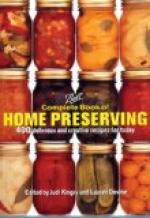CLEANING BEDS
Beds come to pieces and go out of doors, where the slats are washed with carbolic-acid water, and springs and woodwork thoroughly brushed and sprinkled with corrosive sublimate and alcohol, if traces of bugs are found. If the beds are enameled, they are washed entire, with the exception of the brass trimmings, with hot water and ammonia, and wiped dry. Bedclothes, mattresses, and pillows are hung out and sunned, mattresses and pillows both beaten, and the former carefully brushed, going into each tuft and crevice. Shades which have become soiled at the bottom can be reversed. House cleaning is not an unmixed joy, but if done systematically, one room at a time, it is soon accomplished and becomes a part of that biography which all housekeeping is at last—a biography which should be written in characters of gold, its pages richly illumined with crosses, and palms, and laurels, and at its end a jeweled crown bearing the inscription:
“She hath done what she couldn’t!”
CHAPTER XIV
HIRED HELP
The difficulty of dealing with the subject of hired help is about as great as the dealing with the help herself, who is so often not a help at all. The appellation is the one insisted upon by the great unorganized union of the “household tramp,” whose pride cannot endure the stigma implied in the name “servant,” and who has never learned that we, in all walks of life, are more or less servants—servants of Fame, or Ambition, or Duty, or Country, or Business. The maid who gave notice on the spot because she was introduced by the daughter of the house to her mother as “your new servant,” seems to be the incarnation of that spirit of independence which is loosening the very foundations of our national structure. England has servants; Germany has servants, but America has help. Let us then, like Agag of old, walk delicately, remembering that help, by any other name, is even more surrounded by thorns.




